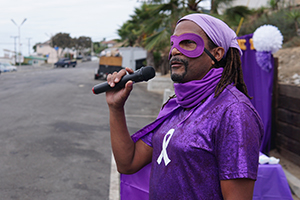Since its creation in 1998, the Ronald S. Hirshberg Translational Pancreatic Cancer Research Laboratory has been at the forefront of pancreatic cancer research. Helmed by Dr. Guido Eibl, the lab is focused on understanding the intricate ways diet, obesity and inflammation can accelerate tumor development. Dr. Eibl and his research team have an accomplished track-record of NIH-funded projects. Despite the uncertainties in research due to COVID, Dr. Eibl and his team continues to publish in prominent journals and receive significant, multi-project funding from NIH.
The Translational Lab has been a pioneer with collaborative projects and we look forward to sharing their progress.
Publications from the Translational Laboratory in 2021
1. Direct Effects of Lipopolysaccharide on Human Pancreatic Cancer Cells.Pancreas 2021;50(4):524-528 (PMCID: PMC8097724)
R.L.Massoumi, Y.Teper, S.Ako, L.Ye, E.Wang, O.J.Hines, G.Eibl.
This paper provides evidence that lipopolysaccharide, a component of bacteria that is elevated during obesity, has direct effects on pancreatic cancer cells. This may explain why in the obese state pancreatic cancer cells seem to grow more quickly.
Pancreas is a multidisciplinary, international journal involving both basic and clinical research on the exocrine and endocrine pancreas and their interrelationships and consequences in pancreatic diseases, including cancer.
2. Metformin: Review of Epidemiology and Mechanisms of Action in Pancreatic Cancer. Cancer and Metastasis Reviews 2021,40(3):865-878 (PMCID: PMC8556217)
E.Rozengurt, G.Eibl.
The paper reviews the current literature on the role and actions of metformin, a widely used anti-diabetic drug, in pancreatic cancer. Our own data and evidence from epidemiologic and preclinical studies, show that the antidiabetic drug metformin possesses beneficial effects in pancreatic cancer, including reducing the risk of developing the disease and improving survival in patients with early-stage disease.
Cancer and Metastasis Reviews is a quarterly peer-reviewed medical review journal covering oncology and the development of new cancer treatments.
3. Obesity and Pancreatic Cancer: Insight into Mechanisms. Cancers 2021,13(20):5067 (PMCID: PMC8534007)
G.Eibl, E.Rozengurt.
This publication summarizes epidemiologic and preclinical evidence and novel concepts by which obesity promotes pancreatic cancer. Among various potential mechanisms linking obesity with pancreatic cancer, the adipose tissue and obesity-associated adipose tissue inflammation play a central role. This review paper discusses selected topics and mechanisms that attracted recent interest and that may underlie the promoting effects of obesity in pancreatic cancer.
Cancers is a peer-reviewed, open access medical journal of the oncology field published semimonthly.
4. Crosstalk between KRAS, SRC and YAP Signaling in Pancreatic Cancer: Interactions Leading to Aggressive Disease and Drug Resistance. Cancers 2021,13(20):5126 (PMCID: PMC8533944)
E.Rozengurt, G.Eibl.
This manuscript surveys the current literature on the role of SRC and YAP in pancreatic cancer. It postulates, supported by novel original data of our own, that a complex signaling network exists between SRC, YAP, and Kras, which emphasizes the therapeutic potential of a combination of SRC and MEK inhibitors.
With additional publications under review and grant proposals under consideration, we look forward to sharing updates from Dr. Eibl and his lab in the near future.


